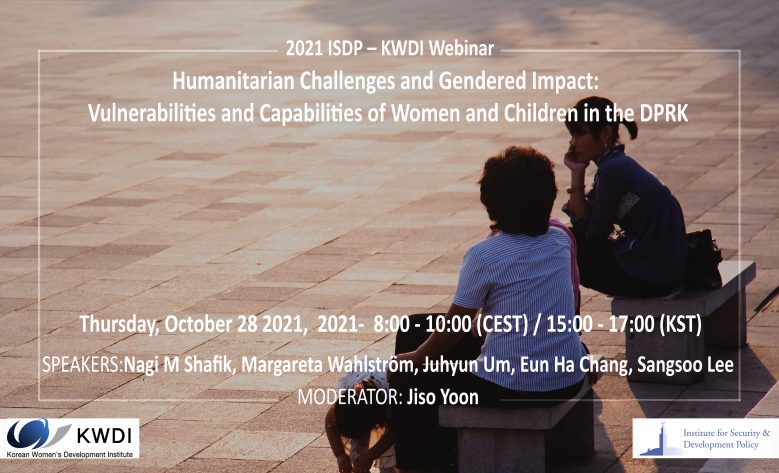Humanitarian Challenges and Gendered Impact: Vulnerabilities and Capabilities of Women and Children in the DPRK

More than a year and a half has passed since North Korea shut down all cross-border exchanges in response to Covid-19’s spread and the humanitarian situation in the country is deteriorating as a result of the strict self-imposed pandemic measures, recent natural disasters and the increased impact of sanctions. Given the gendered nature of all humanitarian crises, it is logical to presume that the current humanitarian challenges are disproportionately affecting women (and children) in the DPRK, necessitating a discussion about the specific vulnerabilities and capabilities of women and children in the DPRK during times of crisis. Against this backdrop, the Institute for Security and Development Policy (ISDP) and Korean Women’s Development Institute (KWDI) is hosting a webinar on the humanitarian challenges of the DPRK with a focus on the vulnerabilities and capabilities of women and children. The primary objective is to share information and identify the main challenges that women and children in the DPRK face so that, when the political impasse ends and humanitarian aid can fully resume, stakeholders will be prepared to act quickly based on the assets and capabilities that have already been established among women and local communities in the DPRK.
We are honored to have a distinguished panel join us in this webinar. Nagi M. Shafik is a public health advisor. Margareta Wahlström is the former president of the Swedish Red Cross and former special representative of the UN SG for Disaster Risk Reduction. Juhyun Um is the executive director at Medical Aid for Children. Eun Ha Chang is the director at the Center for International Development Cooperation at KWDI. Sangsoo Lee is a Senior Research Fellow and Head of the Stockholm Korea Center at ISDP. The event will be moderated by Jiso Yoon, Associate Research Fellow at KWDI.
The full recording of the webinar is now available on ISDP’s YouTube channel.